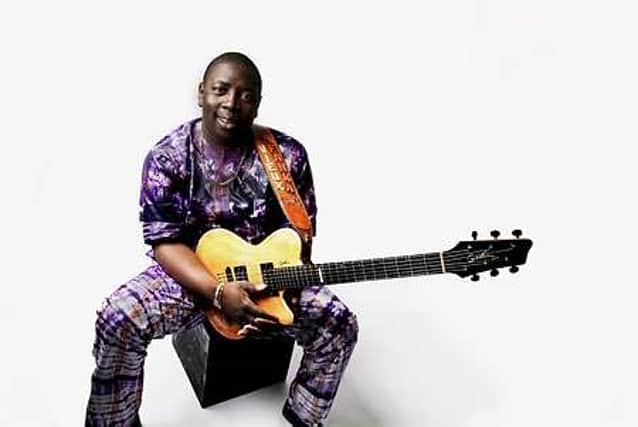Talking Gigs: Vieux Farka Toure, Yellow Arch Studio, Sheffield.


But, thankfully for all our sakes, the Malian guitarist and singer followed in his father’s guitar licks and continues that “Desert Blues” legacy today as an international star.
In conversation with Andy Mason, Vieux explains why his father was very strongly opposed to him being a musician and it was only at the end of his life that he accepted that it was his destiny to follow him in music.
Advertisement
Hide AdAdvertisement
Hide AdIt seems Ali had a difficult life and he encountered many bad situations and bad people in music.
He was not educated in school, so he could not read contracts, and he was taken advantage of for that reason.
He was often swindled by those that claimed to be working for him, Vieux says, and became very upset with the music industry in general.
This is why he did not want his son to become a musician and preferred that he joined the military, where he could earn a steady and honest living.
Advertisement
Hide AdAdvertisement
Hide Ad"But I am not a soldier, I was born a musician," Vieux says to applause.
That he managed to win his father round was some feat — with help from his grandmother.
On one occasion, we learn, she had to literally step in, armed with a shoe, to save him from Ali who was chasing him with the intent of punishing him for not doing a chore.
It was a fascinating insight and more about the role of women in Mali would have been welcome. For instance, are there any women musicians?
Toure’s homeland is war torn.
Advertisement
Hide AdAdvertisement
Hide AdAfter an initial uprising by Tuareg people, Islamic insurgents took control of northern Mali, banned music and targeted musicians, including in Toure’s hometown of Niafunke.
French troops intervened on the side of the military government and the country remains in crisis.
In Mali, music is everything, he tells us.
And musicians play a lot of important roles, telling the people what is happening in society, in politics and the outside world.
Musicians, he says, are also like historians, carrying forward the stories and lessons of the ancestors.
Advertisement
Hide AdAdvertisement
Hide AdBut, he says, they must “entertain the people, bring them joy, inspire them, give them hope, make them dance and forget their problems”.
Toure, who started out as a drummer, hates rehearsing and likes each performance and recording to be a one-off, he says.
He says most songs are not about love but about universal lessons of life, of the importance of Mali culture and solidarity between all the people to stay strong.
But the talking was really only a means to get everyone up dancing and at the end, with chairs pushed to the side, the crowd thrilled to the rhythmns of this exciting, funny and extremely talented performer.